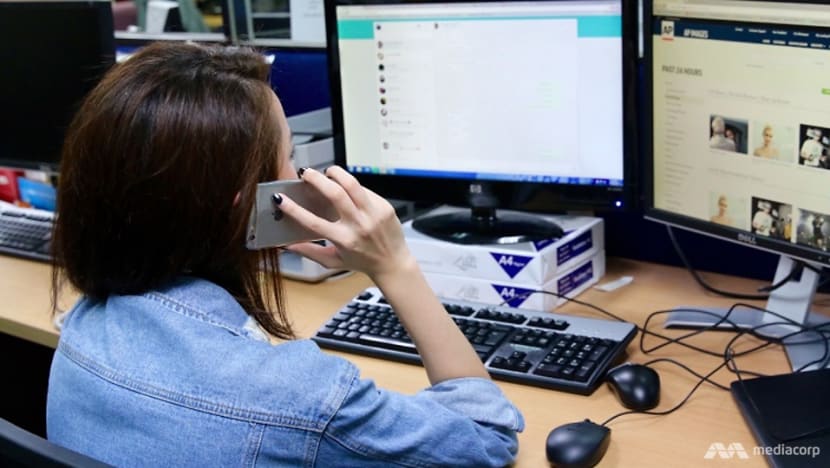commentary Commentary
Commentary: Multitasking, a real productivity killer
A battle is being waged today for your attention. Make sure you win it, says NUS Centre for Future-ready Graduates’ Dr Gregor Lange.

A woman looking at a computer while answering a call.
SINGAPORE: A new global war is being fought as you read this. The battle is not for oil or other precious materials.
You are what they are fighting for, or more specifically, your attention.
For big tech companies like Apple, Google or Facebook, attention is the new currency, a scarce commodity in our limited hours of consciousness every day. Software engineers and app developers are using principles from the science of addiction to get you hooked on their products.
They want your attention frequently, grab it for as long as possible, and they want it now. Your attention equals their revenue.
Their strategies seem to paying off. Students frequently check social media during classes. In team meetings, it is not uncommon to see staff engrossed in WhatsApp chats, and many couples spend more time at dinner glancing at their smartphones than into each other’s eyes.
If you are a ”mild” user of your smart phone, research shows you probably click or swipe it around 2,600 times a day, while heavy users can reach about 5,400.
Singaporean millennials spend on average 3.4 hours per day on their mobile phones.
As you read this commentary, you are probably attending to several things at the same time, dividing your attention between social media, work and personal projects.
Perhaps you have checked your phone a few times before getting to this part of the commentary. Welcome back.
EPIDEMIC OF ATTENTION PROBLEMS
As this battle for your attention is taking place, we are witnessing an epidemic of attention problems across all domains of life.
You might think multitasking improves your life, but it’s actually the complete opposite.
Researchers from Stanford years ago set out to examine the benefits of multitasking in more detail, how we can become better at it, and perhaps how it might even enhance our brain functioning.
The results were surprising to many, and I imagine that tech companies prefer you didn’t know what the scientists concluded.
They found that multitasking actually kills your productivity and has a lot of serious negative consequences, such as increased stress, more errors and a reduced ability to see the bigger picture. Worse, you will ultimately take longer to complete tasks.
If that alone is not enough to put you off multitasking altogether, take note that it also erodes your attention abilities, making it harder and harder to stay focused when you really need to or want to.
Neuroscientists have shown that your brain doesn’t actually “multitask” at all. Rather your brain rapidly switches between tasks.
What that means is that it will take you longer and require more effort to re-focus and fully get back into a given task every time you turn to something else like a text message while working.
In summary, multitasking is bad for you.
THE ANTIDOTE: SINGLE TASKING
You can optimise your focus and get more done by single tasking. Single tasking does not mean you need to tell your boss you can only take on one project to work on.
Rather, it means you intentionally focus on one project at a time, for a specific period, before turning to another project. Even though it may seem counter-intuitive, you will be more effective.
The good news is that you can enhance your attention further by following these tips.
1. SET UP YOUR ENVIRONMENT FOR SUCCESS
Set yourself up for success by minimising distractions in your environment. This includes turning off instant notifications on your computer or smart devices, such as email alerts or WhatsApp message alerts.
When you are focusing on something important, turn your phone to silent and put it away, and close tempting browser windows.
2. SET UP SPECIFIC PERIODS FOR FOCUS
Allocate concrete periods of time to a single task. It is important that these are not too long, for instance, up to 30 minutes. Such short periods will help maximise your concentration.
After the period ends, take a mini break. Go have a snack or go for a walk for five minutes to allow your brain to relax for a while not having to focus on anything in particular.
3. ENHANCE YOUR FOCUS BY PRACTISING MINDFULNESS
Secular mindfulness training involves enhancing your awareness and practising paying attention to the present moment. It has been shown to enhance the ability to focus and concentrate.
Enroll in a mindfulness course or use one of the many Apps as an introduction to this highly useful brain training.
4. GET ENOUGH SLEEP
Are you getting enough sleep? Singaporeans are notorious for burning the midnight oil and not getting enough sleep, with 44 per cent sleeping less than seven hours daily.
However, chronic sleep deprivation will negatively impact your concentration and memory. Looking through your devices before bedtime is one key factor linked to this problem.
Simply getting enough sleep could be the easiest way of enhancing your ability to get most of the next day.
As a psychologist and educator, I feel it is our responsible to educate people about the risks of multitasking and tech addiction, and how you can claim back and even enhance your attention to focus on what truly matters to you.
By breaking the habit of multitasking and focusing on just one thing at a time, you can achieve more, experience less stress, and feel more connected to people around you.
This is a battle you can win through the power of your own attention.
Dr Gregor Lange is senior lecturer at the National University of Singapore’s Department of Psychology.
This is the third commentary in Channel NewsAsia’s series with the NUS Centre for Future-ready Graduates on achieving career success.
Read the first commentary on whether work-life balance is as elusive as most people make it out to be.
Read the second commentary on why networking is not a dirty word but a necessary skill.















